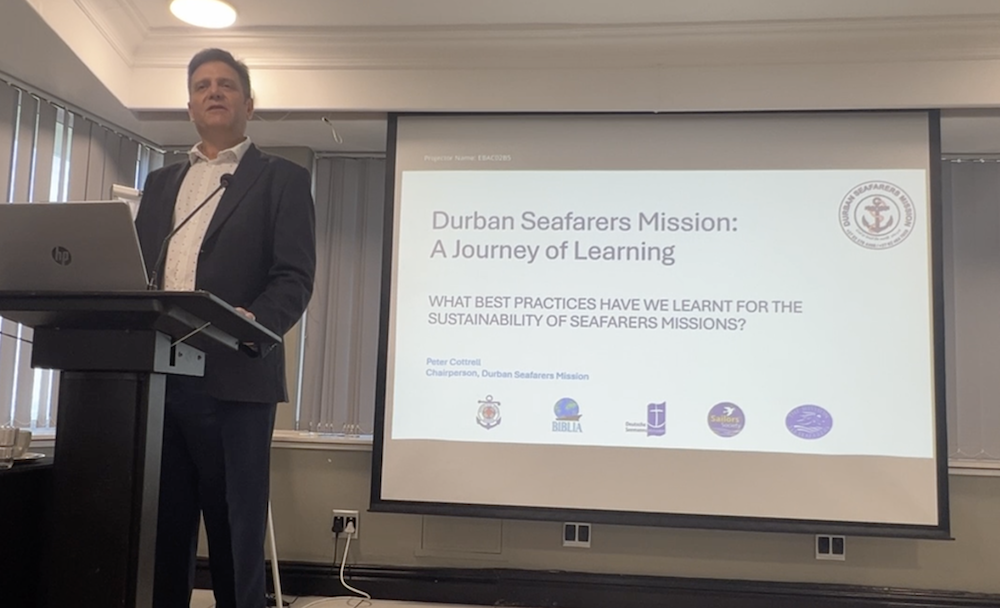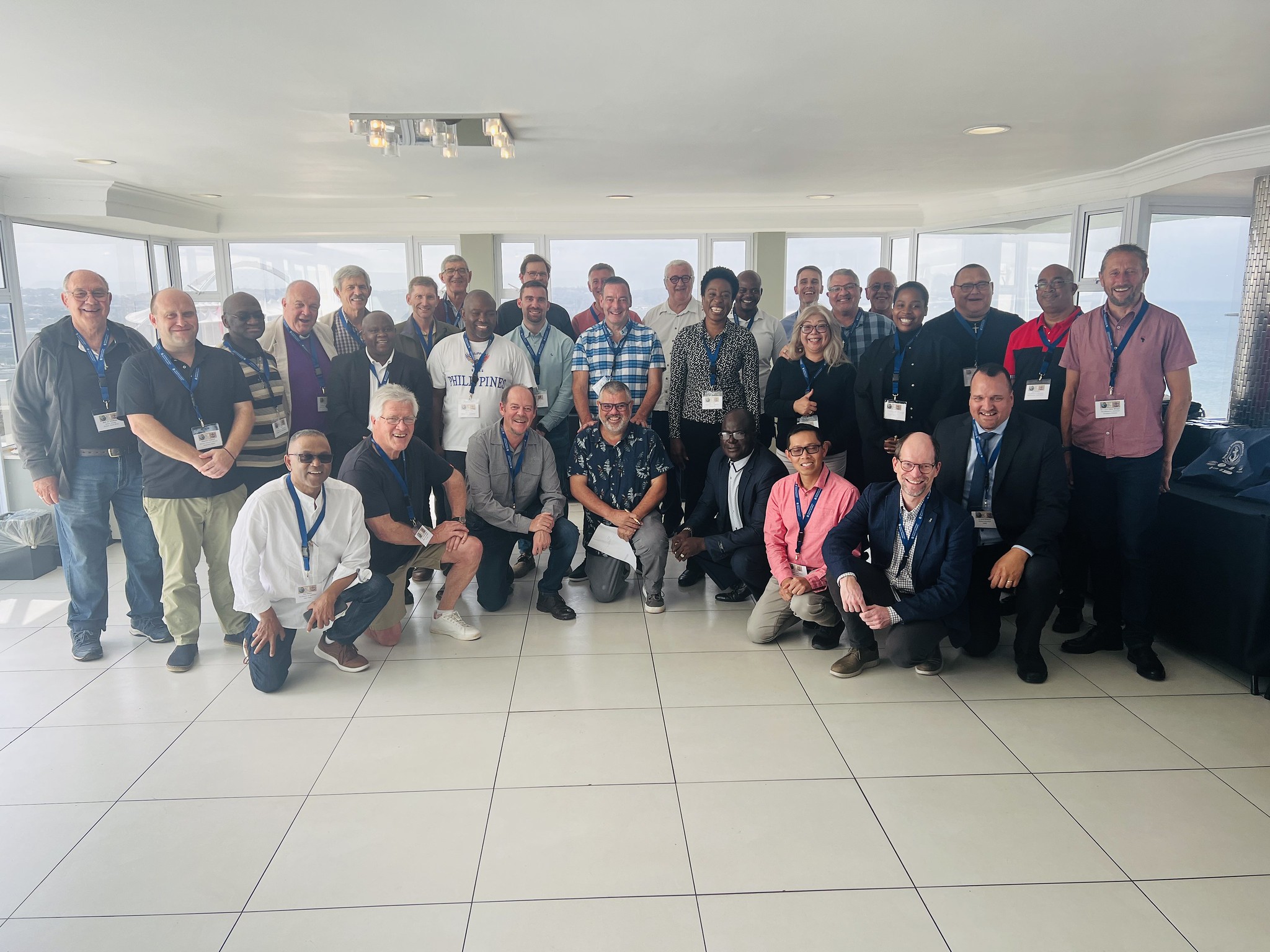Image: When seafarers arrived in the Port of Montreal on April 3, they texted local Chaplain David Rozeboom for some sweets which he then purchased and delivered to the gangway.
The coronavirus crisis has deeply impacted the ministry methods of Christian seafarers’ welfare charities around the world. Ship visitors and chaplains have had to adapt their ways of ministry to find new opportunities to serve seafarers, and have had to take new measures to respect all health and safety concerns. To find out more, we surveyed hundreds of social media posts from ministries around the world. These social media posts reveal the intense challenge of balancing health and safety with the continuing desire to serve seafarers.
The challenges for us and for seafarers are many. Most cargo ships continue to transport goods around the world to keep our store shelves stocked, except on cruise ships, where crews are being pared down to minimum levels as cruising has effectively stopped. The remaining seafarers are sailing under increased pressure and fatigue with extended contracts, as getting fresh crew members is unmanageable with national borders closed and cities on lockdown around the globe. Even when countries designate cargo ship crews as essential workers, signing on or off is practically impossible for the foreseeable future, as many airlines have cancelled flights. Seafarers on board are exhausted, and the seafarers at home are desperate for a paycheck.
As cities and ports have instituted social isolation programs, traditional forms of ministry like visiting seafarers on their ships, welcoming them in drop-in centers, and transporting them to shops in town is now more or less impossible. Seafarers’ ministries around the globe have had to come to what seems like a standstill.
So, is ministry still possible?
Before we think about our possibilities, it is important to emphasize: even if ministries have the will to help, there is every reason to err on the side of caution. Many ministries rely on older volunteers that are in the most vulnerable age group for the virus. Many chaplains are in vulnerable age groups, and others are vulnerable due to other health concerns. A chaplain or volunteer who gets infected can unknowingly transmit the disease to others in their community, which could lead to hundreds more cases and more deaths. From the seafarers’ perspective, too, we should remember that we are more likely to carry the virus to them than they are to us. Ship visitors staying away is for their own protection, yes, but primarily for the protection of seafarers.
There still seems to be some openings for ministry. These openings require caution, creativity, and hard work, but they also address a time of great need for seafarers. Seeing all the ways ministries are finding these openings and stepping into them for seafarers was one of the most rewarding parts of this survey.
New approaches to in-person interaction
In ports where local authorities are allowing it, chaplains are practicing ‘gangway only’ visits. These visits pay close attention to local port regulations and all relevant health guidance. Ship visitors practice social distancing and frequent hand washing and wear PPE as advised.
In these cases, chaplains come to the gangway without entering the ship as they would normally do. Chaplain David Rozeboom of the Ministry to Seafarers in Montreal, Canada writes, “We remain active in the Port of Montreal visiting with seafarers on the deck of the ship and trying to arrange items that the crew need.” He makes deliveries of literature or SIM cards via a mail bucket.
The London Tilbury Seafarers’ Centre, managed by Queen Victoria Seamen’s Rest, continues to deliver to gangways: “We are still providing a service to seafarers berthed at Tilbury whilst the seafarers’ centre is closed due to port restrictions. We will provide a ‘one stop’ delivery to the ship gangway. Please call [contact number] with a list of your top-up/data sim requirements (limited toiletries are also available).”
Similarly, the team of the Seemannnsmission in Cuxhaven, Germany, shared, “Instead of visiting you on your ship in the Port of Cuxhaven without announcement, we will visit you on board only if you invite us. So if you need phonecards, information, newspapers, counselling, or anything else, pls. contact us and we will visit you. Also if you are not allowed to go shopping due to work or other reasons, feel free to contact us. In this case we will try to get the things you need from the shop.”
At the Mission to Seafarers in Townsville, Australia, the local team brings a small selection of goods for sale on a fold-up table near the gangway of certain ships. If a seafarer would like to purchase, he can approach and pay.
In some ports, seafarers’ ministries will run errands for seafarers who cannot have shore leave. Rev. Simon Ro, The Mission to Seafarers port chaplain in Yokohama, Japan, shared that he is “buying things from the city and bringing it back to seafarers on board ships. We received an email from the captain of a ship in port who asked us to buy some cup noodles for him and his crew, as they were not allowed to go ashore due to restrictions. On March 23rd, we were able to buy the noodles and deliver it to the ship. The captain and his crew were thankful that we were able to meet this need.”
Ministry from a distance
Besides gangway visits, many seafarers’ centers are creating care packages for crew that can be delivered with the help of harbour masters, port pilots, and shipping agents. On the Tyne River in the UK, Stella Maris chaplain Paul Atkinson has created care packages to share with seafarers to show care and support. Atkinson said, “These packages contain religious items such as palm crosses, prayer cards, prayer books, rosaries, &c., toiletries, chocolate and sweets, our monthly Stella Maris Magazine, and other small appropriate items.”
Similarly, The Mission to Seafarers in Gladstone, Australia has pulled together almost 300 care packages for crews visiting in the next weeks. They shared, “The first of our welfare boxes was delivered to a vessel berthed in Gladstone today. This has been a major collaboration of so many local businesses, industry players, union, state and federal government departments, volunteers and staff.”
Most seafarers’ ministries have taken to the internet to try to connect with seafarers. The first thing for most ministries is simply to update their websites and social media pages to reflect the services they can continue to share. The head office of the Deutsche Seemannsmission shared a comprehensive list of services that are being offered at all its affiliated ministries. Similarly, the Fishermen’s Mission put together a list of resources to navigate the challenges of COVID-19 for the fishing industry.
Many chaplains have a long list of seafarer names in their digital rolodex that they are contacting to share a word of encouragement or to catch up on news. Most have made their contact details available so that seafarers can chat if they wish by text or voice. Some chaplaincies have even come up with new technologies for reaching out: the Danish Seamen’s Church launched a new chaplain chat website, available principally for Danish-speaking seafarers, and the Mariner’s Club in Hong Kong launched a new seafarers app that helps visiting seafarers get up-to-date information on the services that can be provided.
Coming together in faith
Special prayer and religious messages are also being shared by port chaplains online. The North American Maritime Ministry Association is offering a 15-minute time of prayer for its members every Tuesday and Friday for the month of April. In the Netherlands, Rev. Pascal Handschin and Rev. Stefan Francke, both affiliated to the Nederlandse Zeevarendencentrale, have started a similar-length series of video recorded sermons and prayers from the chapel of The Mission to Seafarers in Vlissingen.
Ministries around the world are adapting to find possibilities for ministry faced with the coronavirus challenge. These new methods require close attention to health guidance on social distancing, but also demonstrate tremendous dedication in finding opportunities to serve those who might need it most.





